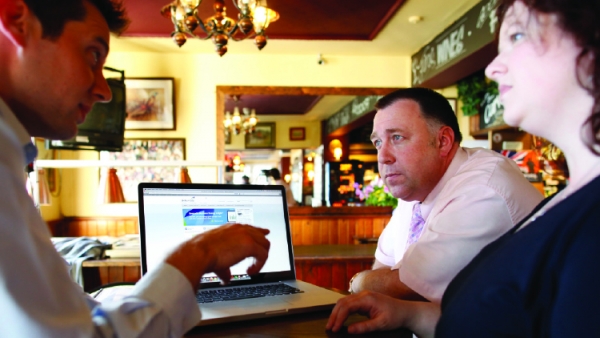Street smarts: BDM career progression

One thing Craig Nevins isn’t short of in his role as business development manager is different duties.
“I have to be accountant, licensing officer, retail auditor, chef, food technician, business consultant, investment specialist and front-of-house manager,” he says.
“It is extremely varied, which is one reason why I love it. I am always learning new things.”
Business development managers (BDM), sometimes known as area or operations managers, generally work at a regional level to ensure the best possible outcomes from a number of pubs within a chain.
As well as the variety, Nevins enjoys the opportunity to overhaul outlets and put his own stamp on them.
“I am passionate about investment in underperforming pubs to turn them around,” he says.
“It’s a great feeling to witness and be part of transformational investments, seeing a once-struggling pub flourish and creating sustainable job opportunities in the local area.”
Nevins came to his current role at Heineken-owned Star Pubs & Bars via a regional sales position at the Dutch parent company. Before that, he worked elsewhere in the food and drink industry, starting as a graduate sales trainee at Cadbury Schweppes in 2000.
He suggests that having a vision for your own career is as important a part of becoming a BDM as having a vision for struggling pubs.
“I really believe you need to own your own career path and decide where you want to go,” says Nevins. “This includes understanding what your strengths are, reflecting on any skills gaps and then planning the right career path and timing that to the best of your ability.”
He exemplified this process when he took annual leave to attend a five-day residential course run by Star Pubs & Bars for new licensees. “This gave me the insight into the business I wanted, and I believe showed my resourcefulness and commitment,” he says.
“When a job came up, I went for it and got it. You have to show a degree of tenacity, drive and desire.”
Once in the job, it is important to communicate well and build relationships with the wide range of people you come into contact with, Nevins says.
“Underpinning this is the need for a strong moral compass because you are dealing with people’s livelihoods, so you have to be emotionally intelligent.”
Beyond soft skills
But the job requirements go much further than these softer skills.
“It is essential to understand processes, and profit and loss accounts. If a business is not doing well, you need to identify why and have the know-how to make it better.”
Staying in touch with market developments through networking and reading the trade press is also important, he says.
Nevins has worked with a mentor as well as attending cross-function group sessions with staff in other areas of the business. He also runs licensee forums. Heineken has a BDM academy to help people step up into the role.
Looking ahead, he hopes to further his focus on turning pubs round.
“It’s hugely rewarding to take a pub from its end-of-life cycle and to turn it around through recruitment and investment. If an opportunity arose to do a job like this, it would be one I’d be interested in taking up.”
Relationship skills
Anna Clissold has been a BDM for 16 years. She started with Punch after completing a business degree and working in the recruitment sector. She moved to Admiral in 2011.
“The recruitment sector was going through a torrid time in 2002,” she says, “and Punch was looking for BDMs.” She says she applied for the role because it was based on relationships and strong communications skills. “I liked the sound of it, although to be honest I didn’t have a clue what I was going into.”
She says the recruiters at Punch said her communication skills were transferable, and that they liked her passion and energy. “They said they would teach me the rest.”
She started off in Cornwall and the south-west looking after 60 pubs.
While there is a lot of training available, she says she really learnt on the job. One example of this is that early on in her career, Clissold was given two very different mentors.
“Punch gave me two mentors: one area manager who was very highly structured, organised and process-driven called John, and another called Graeme who was very inspirational and would just go at it and be very creative.
“They said we’d like you to have half of John and half of Graeme, that would be the perfect BDM. But we want you to see the different ways people can do the job and still yield the same results.”
Never stop learning
This experience stood her in good stead. However, she says that continual learning has also been crucial. “We always have training courses provided by Admiral. I also do training courses for my tenants and I’ll make sure I attend those courses. I never want to say I know everything because things need refreshing. Somebody may come up with one great nugget [of information] that I don’t know. Even after doing it for 16 years I don’t know everything, and it’s an ever-changing industry and an ever-changing sector.”
The job and the industry now is very different from 16 years ago, she explains. Pubs offer more food, accommodation and services than they ever have, requiring a lot of BDMs.
“The job is still as varied but we are much more interactive with the pubs now. When I was in the pubs before it was about, how is your beer volume going, how is your licence going? Now when I’m in the pubs, we talk about much more granular detail about stock, yield, performance, price management, retail offer, development, services. Before it was more holistic, now we look at each pub and ask ‘what are your needs and how can I help you to deliver that?’”
With such wide-ranging challenges, Clissold says she’s not afraid to consult other people. “I might ask whoever has the specialism. That may be accountants, the stock takers – because we’ve got those people in-house – legal advice, surveyors, valuers and other BDMs. I’ll talk to tenants, multiple operators in-house, my director, and even our CEO Kevin Georgel. We’ve got a very open culture at Admiral.”
Would she recommend the job to others? “There’s nothing more fantastic than taking a pub, investing in it, opening it, developing it. You go in and you thrive off the energy, ideas and enthusiasm of your tenants – it can be so rewarding.”
She says the most important thing for a successful BDM is to be a strong person, with creativity, lots of energy and passion. “And you’ve got to love pubs.”
Up through the ranks
Adam Sykes is operations manager at Fuller’s, having worked his way up through the industry.
“I started pulling pints at Bridgewater Hall in Manchester after university,” he says. “I went travelling, worked at the Sydney Opera House in Australia, came back and joined All Bar One as a deputy manager.”
He later joined Fuller’s as a general manager at its city-based pub Shaws Booksellers. After a successful six-year stint he started to look for his next step but – as with Nevins – Sykes had to use his initiative to get a promotion.
“It can be hard to get to the next level,” he says. “There were vacancies for operations managers and although I didn’t have experience in a multi-site role, I applied to signal my intent, not expecting to get the job.”
As it was, he was taken on in a specially created deputy role, and given support and development.
Sykes warns would-be BDMs that the step up from running one pub to overseeing the growth of many is a big one. “It’s very, very tough, a steep learning curve,” he says.
Sykes rode this curve with help from those around him. “I learned a huge amount on the job,” he says. “I had senior operations managers acting as mentors so I went to them with any questions I had - and there were a lot.”
Fuller’s has since implemented a development programme for prospective operations managers.
“There are various modules on the course but it is not time-prescriptive,” says Sykes. “It is tailored for the individual.”
He says it is hard to get anyone completely ready for the abrupt change in daily life that the promotion to area manager can bring.
“The biggest difference is that your job becomes based around meetings, phone calls and emails,” he says. “The general manager role is much more face-to-face with customers and staff.
“You become looked at as senior in a role you were never junior in. I had no experience of meetings.”
Ask questions
Sykes agrees with Nevins that the role is varied, and relishes the fact no two days are alike. “This morning I’ve had a call about a ceiling falling in overnight in one of our pubs, so I now have to figure out what to do about that,” he says.
“It’s everything to ensure our pubs are set up to delight our customers – so recruiting the right people, developing them where needed, making decisions on food menus, ensuring our drinks range is right, we look after the marketing – it’s really wide ranging.”
Sykes still enjoys a range of learning and development as he seeks to improve further in his role.
“I have a mix of formal and informal training now. As an operations team, we have development days every other month, looking at an area normally driven by the team itself. I was fortunate to be on an 18-month advanced leadership programme looking at areas of business.”
He has also studied different sectors and countries as he looks to better himself because “getting out of the immediate circumstances is really useful”.
Key attributes to be a good business development manager include resilience and people skills, says Sykes.
He adds: “My main advice to people is to ask questions.
“People come into this role having been successful in a previous job and having been used to knowing everything – then when you make the step up it changes.
“If you don’t ask for help and support on a daily basis, you may get by but you won’t succeed.”








